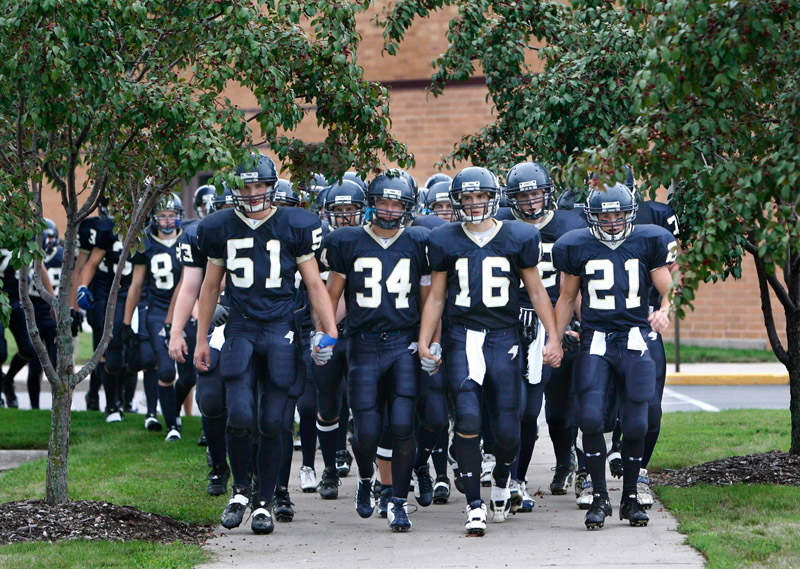Blog
Program’s History
The Men of Code program began in the spring of 2013 at Friendship Collegiate High School in Southeast Washington, D.C. During the summer, the football players prepare for the upcoming school year by lifting weights, conducting SAT prep, receiving life skills training, and engaging in mentorship with their coaches. Men of Code (MoC) fit perfectly into the mission and purpose of Friendship Collegiate High School, teaching the young men about leadership, healthy relationships, and effective bystander intervention. Coaches were trained so they were able to handle any incidents or concerns that arose during a 6 week dating and sexual violence curriculum, along with skills in financial literacy and life outside of football.
MoC builds onto the curriculum of Positive Choices (PC), which has been in place at Friendship Collegiate High School since 2012. This includes education on Domestic, Sexual, and Dating Violence, stalking and bystander intervention, financial literacy skills, and advice for life outside of football. Participants of MoC gain the skills to become leaders in their communities, helping create positive environments using their newly acquired knowledge about creating and maintaining healthy relationships, as well as recognizing warning signs of abusive behavior and knowing what to do if an unhealthy
situation arises. Currently, there are no model programs that specifically reach out to engage men and boys in Wards 7 and 8 in the prevention of violence against women, nor are there any programs which encourage male leadership in a collaborative effort with women and girls to prevent Domestic and Dating Violence in Washington D.C.
MoC works to end violence through prevention. One of the biggest issues the program targets is Teen Dating Violence (TDV). TDV is a pattern of abusive and coercive behaviors used by one person to gain and maintain power and control over an intimate or dating partner. These acts include but are not limited to threats or acts of physical, sexual, and/or emotional abuse, intimidation, isolation, cyber-stalking, spiritual abuse and financial abuse. Research states that violent behavior often begins to develop in girls and boys between the ages of 12 and 18 and awareness and prevention can help overcome unhealthy learned behaviors. MoC targets boys between these ages in order to prevent such behaviors at an early age.
Furthermore, Wards 7 and 8 are in desperate need of measures to encourage high school graduation due to high rates of high school dropout. Keeping homes safe and free of violence is a key strategy in reducing teen dropout rates. By engaging young men of these Wards in the movement to end intimate partner violence through MoC, the scope of prevention efforts in the community will be greatly expanded. Through the program, participants will learn to foster healthy relationships amongst themselves, their teammates and their peers. The players will learn to recognize warning signs of abusive behavior and know what to do if an unhealthy situation arises.
TDV Statistics:
– Girls and women between the ages of 16 and 24 experience the highest rates of intimate partner violence (SOURCE: Love Is Respect)
-1 in 5 high school girls are physically or sexually hurt by a dating partner (SOURCE: The Clothesline Project)
-1 in 3 teens experience some kind of abuse in their romantic relationships (SOURCE: Do Something)
-Only 33 % of teens who have been in or known about an abusive dating relationship report having told anyone about it (SOURCE: Love Is Respect)
-Teen girls face relationship violence 3 times more than adult women (SOURCE: Lindsay Ann Burke Memorial Fund)
-25% of victims say they have been isolated from family and friends (SOURCE: Demibrae)
-More than half of victims say they have compromised their own beliefs to please a partner, and Many teens think this is normal (SOURCE: Lindsay Ann Burke Memorial Fund)
-Teens report dating abuse via cell phones is a serious problem (SOURCE: Lindsay Ann Burke Memorial Fund)
-Cell phone calls and texting mean constant control: 1 in 3 teens say they are text messaged 10, 20, 30 times an hour by a partner keeping tabs on them (SOURCE: Lindsay Ann Burke Memorial Fund)
-82% of parents whose teens were emailed or text messaged 30 times an hour were not aware of this (SOURCE: Lindsay Ann Burke Memorial Fund)
-The majority of parents of teen victims are unaware of the abuse (SOURCE: Lindsay Ann Burke Memorial Fund)
Domestic Violence in DC:
- In 2012, the DC Metropolitan Police Department received more than 31,000 domestic-related calls – approximately 1 every 16 minutes. Over 50% of these calls originated from Wards 7 & 8.
- In 2012, the DC. DV Intake Center at the DC Superior Court provided services to over 5,000 District residents; more than 50% of the recipients, however, lived in Wards 7 & 8.
- 44% of all sexual abuse cases reported in 2009 involved an adult victim, a 1% increase from 2008. Ward 7 & 8 led all wards in abuse frequency.
- Wards 7 and 8 are home to a majority of the most underserved individuals in D.C. Data shows that more than 1 in 4 children in these wards live in poverty. While an awareness and education program focused on the prevention of intimate partner violence cannot address all the needs of these Wards, it can facilitate change by modeling healthy behavior and lifestyles that will lead to improved conditions in these areas.


